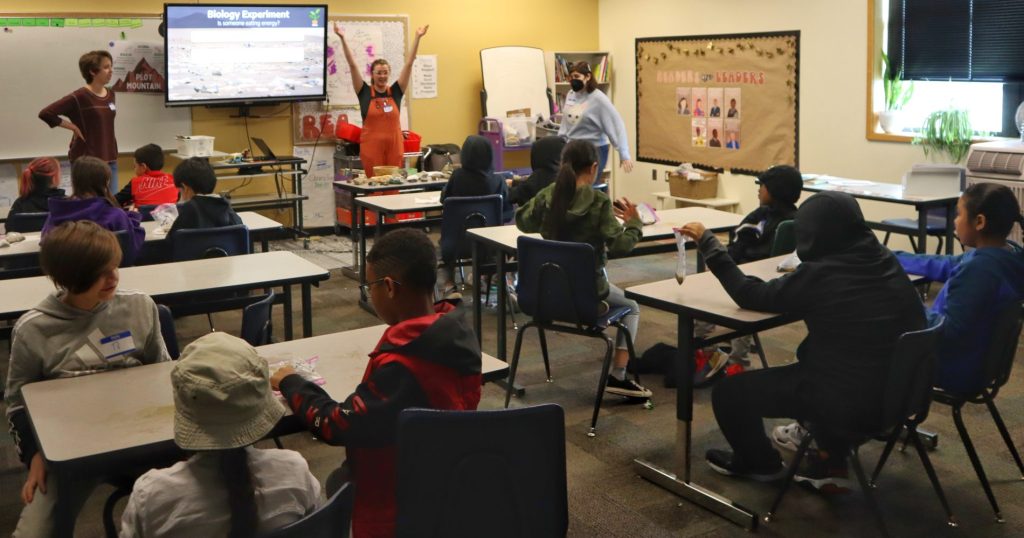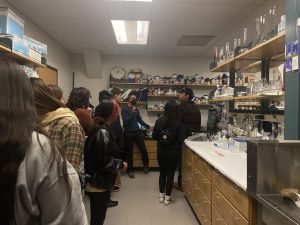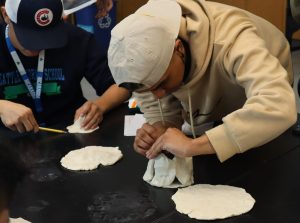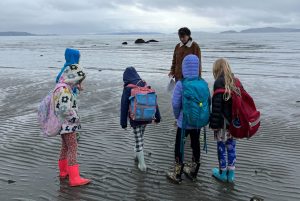
Ethnic and racial diversity of those with doctorates in geoscience is the lowest among all STEM fields in the United States, and has seen no improvement over the past 40 years. Since there are no national standards for geoscience education at the primary or secondary school level, many students are not exposed to these topics in the classroom before entering university. Additionally, K-12 schools that do offer geoscience classes do so in addition to required curriculum, and thus tend to have more resources and serve more privileged communities, which further serves to exacerbate geosciences’ diversity problem. A key aspect of increasing diversity in geosciences is therefore contingent on exposing K-12 students to relevant geoscience curriculum.
Here in the Earth & Space Sciences Department, we are working to teach K-12 students geoscience through the Rockin’ Out Outreach Program. In the past two years, Rockin’ Out has reached approximately 1500 K-12 students through lab tours at UW, guided field trips, tables at school STEM nights, and visits to local classrooms.
Rockin’ Out is currently run by ESS graduate students, Madeleine Lucas and Anna Ledeczi, who serve as the program coordinators. In this role, they plan all Rockin’ Out events by developing lesson plans, communicating with educators and schools, and training and supporting volunteers. They also volunteer at events each quarter; for example, they attended an AGU education section event at the Adler Planetarium this December where they taught families how to identify rocks and minerals, as well as promoting the UW ESS undergraduate program.
- Dr. Drew Gorman-Lewis leads visiting high schoolers through the Geomicrobiology Lab.
- Students at Seattle World School. Photo credit: Richard Parra (Riverways Education partnerships, NESSP).
In order to target underserved communities more effectively, Rockin’ Out has pursued a partnership with the Northwest Earth & Space Sciences Pathways (NESSP) Program, a NASA-funded outreach program, and the UW Riverways Program. Using the NESSP framework, Rockin’ Out have been able to engage in short outreach events at rural and tribal schools in Washington as well as underserved communities in the Seattle area. NESSP actually began in ESS under Robert Winglee’s leadership and is now led by one of Robert’s former students at Central Washington University.
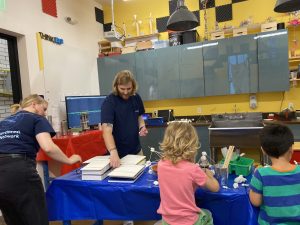
In February 2023, ESS student volunteers Tamara Aranguiz, Barrett Johnson, and Heather Maran developed a geomorphology activity for high school students at the Seattle World School, which serves newcomer secondary students who are linguistically diverse, including those from refugee or immigrant background. The students built geomorphic features from modeling clay—an interactive lesson designed specifically for students with limited knowledge of English—and were able to interact with ESS volunteers who speak Russian and Spanish. The students were overjoyed at learning in their native languages, and sent a heart-felt thank you note to volunteers after the lesson. Students from other schools partnering with NESSP have visited labs in ESS, such as the Geomicrobiology Lab and the PNSN SeismoLab.
Unfortunately, Rockin’ Out has to turn away the majority of requests for events from the community. We aim to improve this by practicing more effective community engagement by prioritizing lasting partnerships with particular schools through repeated volunteer events. Doing this will require expansion of our program: the department hopes to involve more faculty and students, to further support the department’s efforts to broaden participation in the geosciences. We all stand to benefit from a greater commitment to community engagement and science education.
If you are interested in volunteering with Rockin’ Out, please email: . If you would like more information about getting involved and ways to support programs like this, please visit our Department Community page.
